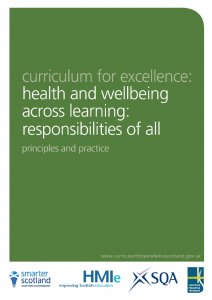
Learning in health and wellbeing ensures that our young people develop the knowledge and understanding, skills, capabilities and attributes which they need for mental, emotional, social and physical wellbeing now and in the future.
Learning through health and wellbeing promotes confidence, independent thinking and positive attitudes and dispositions. Because of this, it is the responsibility of every teacher to contribute to learning and development in this area. Taken from Building the Curriculum 1
Every school, working with partners, will take a holistic approach to promoting health and wellbeing, one that takes account of the stage of growth, development and maturity of each individual, and the social and community context.
Our students can expect their learning environment to support them to:
- develop self-awareness, self worth and respect for others
- meet challenges, manage change and build relationships
- experience personal achievement and build resilience and confidence
- understand and develop physical, mental and spiritual wellbeing and social skills
- understand how what we eat, how active we are and how decisions we make about our behaviour and relationships affect our physical and mental wellbeing
- participate in a wide range of activities which promote a healthy lifestyle
- understand that adults in their school community have a responsibility to look after the students, listen to their concerns and involve others where necessary
- learn about where to find help and resources to inform choices
- assess and manage risk and understand the impact of risk-taking behaviour
- reflect on their strengths and skills to help them make informed choices when planning their next steps
- acknowledge diversity and understand that it is everyone’s responsibility to challenge discrimination.
Read more about Health and wellbeing across learning on the Curriculum for Excellence website
